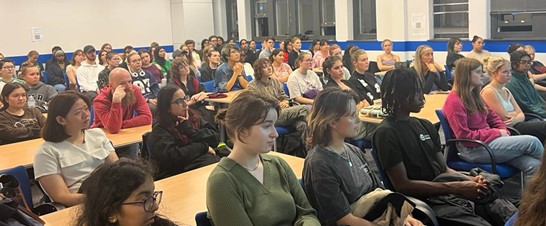The BSL Society: What They Do and Why We Need Them
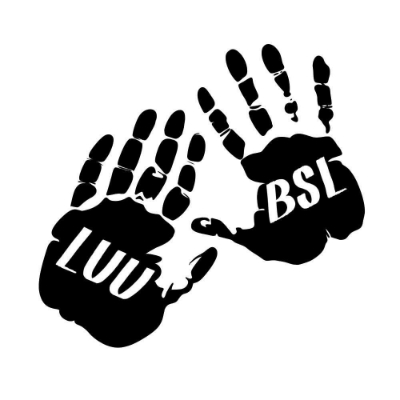
Since its formation in February, the BSL Society has gone from strength to strength, making ‘huge steps in terms of growth and interest’ (Olivia Carson, Co-President) and discovering ‘the large amount of interest and enthusiasm that students, and other University staff/members, have for learning BSL.’ (Katherine Stanton, Co-Secretary.)
The society meets every Friday to teach members correct grammar and new signs according to a specific theme, so far, they have covered topics such as; the basics of BSL, including the alphabet and numbers, university-related signs and, more recently, breast cancer awareness signs. Upcoming topics range from mental health signs, in collaboration with the society Psyched, and holiday-specific signs, where there will be an opportunity for gingerbread decoration! In addition to weekly teaching sessions, there are also monthly BSL Cafés held at the Common Ground. Co-President Olivia Carson says these are a great opportunity for people of all abilities to practise signs and learn from each other in a casual environment.
Crucially, the BSL Society contains members who are part of the deaf community, this enhances the experience of the learner as it allows them to gain accurate and up-to-date information about the language and culture within the community. As Co-President Rahim Karim explains, ‘it is extremely important to expose deaf culture to BSL learners as it assists their learning in a number of ways, such as being able to teach colloquialisms accurately. It also assists them in understanding the evolution of BSL and to improve their communication skills.
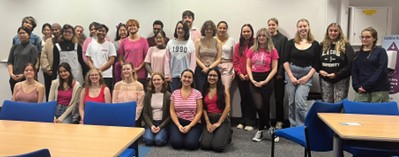
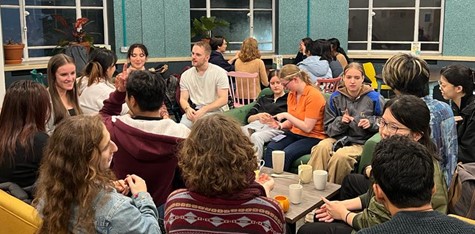
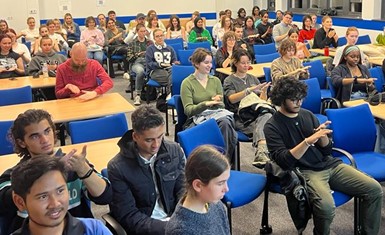
So, why do we need the BSL Society?
Well, according to the Royal National Institute for Deaf People (RNID), one in five adults in the UK are deaf, have hearing loss or tinnitus, and this number is estimated to increase significantly by 2035. As Co-Secretary Katherine Stanton argues, it is clear that learning sign language is an essential skill not only at university but in the wider world and a BSL Society is a great place to start.
The BSL Society here at Leeds offers ‘a safe space to learn’ (Gurleen Bansal, Co-Secretary) about matters of great importance which can often be underrepresented in mass media. Co-President Rahim Karim has highlighted and amended some common misconceptions; ‘I think it’s really important to clarify one thing first – a person who is fully involved in the deaf community is not necessarily a deaf person, the person could be hearing; likewise, some deaf people don’t involve themselves in the deaf community at all.
One major problem with the term ‘deaf’ is that most people assume that they cannot hear at all,’ he continues, ‘each deaf person has varying levels of hearing; hearing aids may be helpful for some, for others, cochlear implants may be helpful, but for some, both hearing aids and cochlear implants will not be helpful at all. Each person requires appropriate, individual adjustments to facilitate effective communication with others. Therefore, it is important to educate people about the wide range of communication tools available.’
EDI Representative Holly Wheeldon and Co-Secretary Katherine Stanton reflected on the issues a language barrier can ensue on people who are deaf or hard of hearing in the, unfortunately common, instance that interpreters are not available for events such as medical appointments:
‘We found it shocking that something as essential as informed consent could be jeopardised by this, and thought about how disheartening it must be for the patient to have their main form of communication taken from them.’
Holly Wheeldon, EDI Representative
Considering the facts from the members of the BSL Society and the RNID, it is clear that opportunities to learn British Sign Language and to spread ‘awareness about the issues faced by the deaf and hard of hearing community’ (Katherine Stanton, Co-Secretary) are essential within our university, our country, and society as a whole.
In the future, the BSL Society hope to ‘develop [their] relations with other societies in the university and external companies/charities’ to increase the awareness being raised on issues pertaining to the deaf and hard of hearing community, and, in time, they ‘also hope to have accredited courses for our members so they can gain BSL qualifications’ (Olivia Carson, Co-President). If this sounds like something you would like to participate in, then follow the BSL Society on Instagram @bslsocleeds for a range of information including, but not limited to; the times and locations of their events, upcoming collaborations with other societies or external organisations, and ‘Sign of the Week’ posts.


